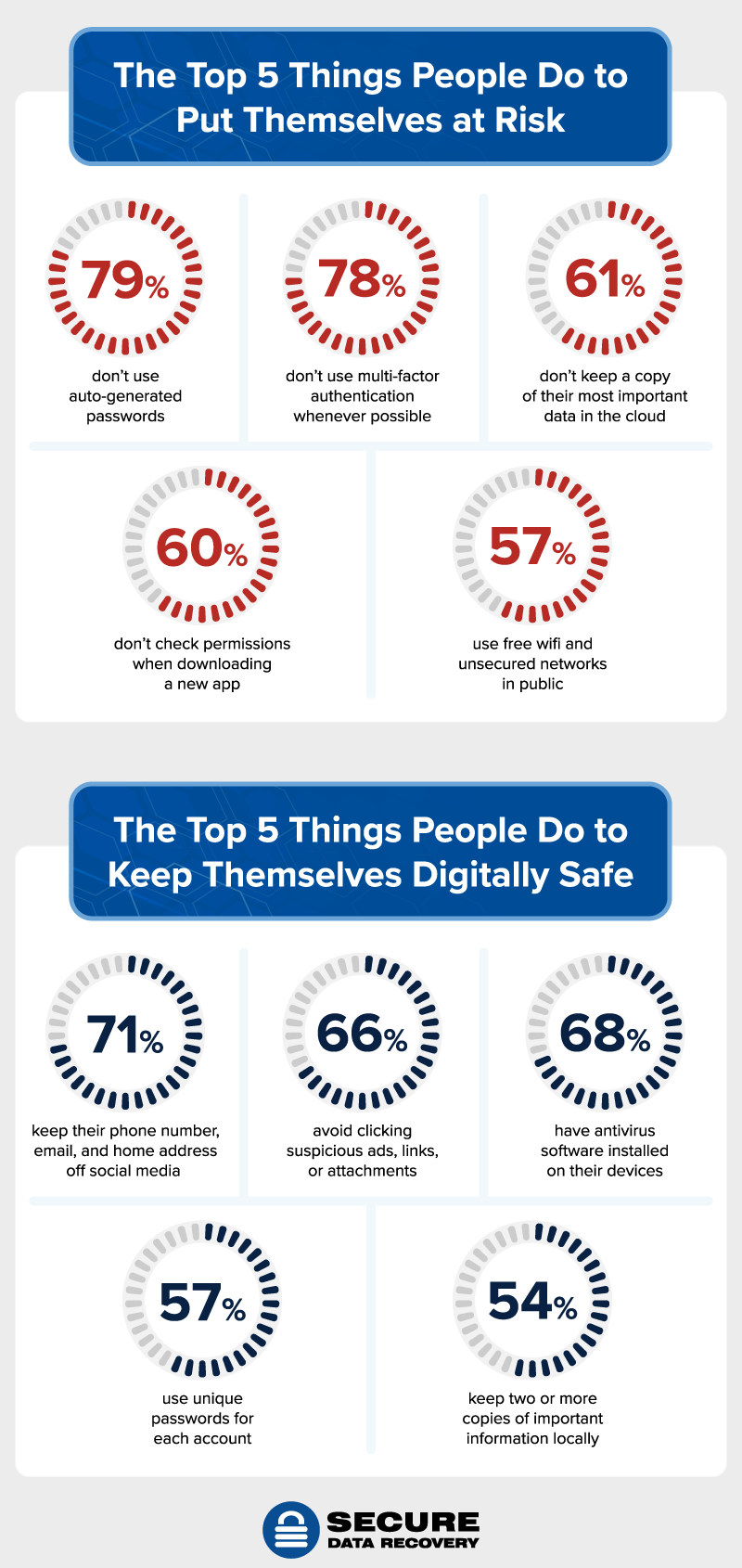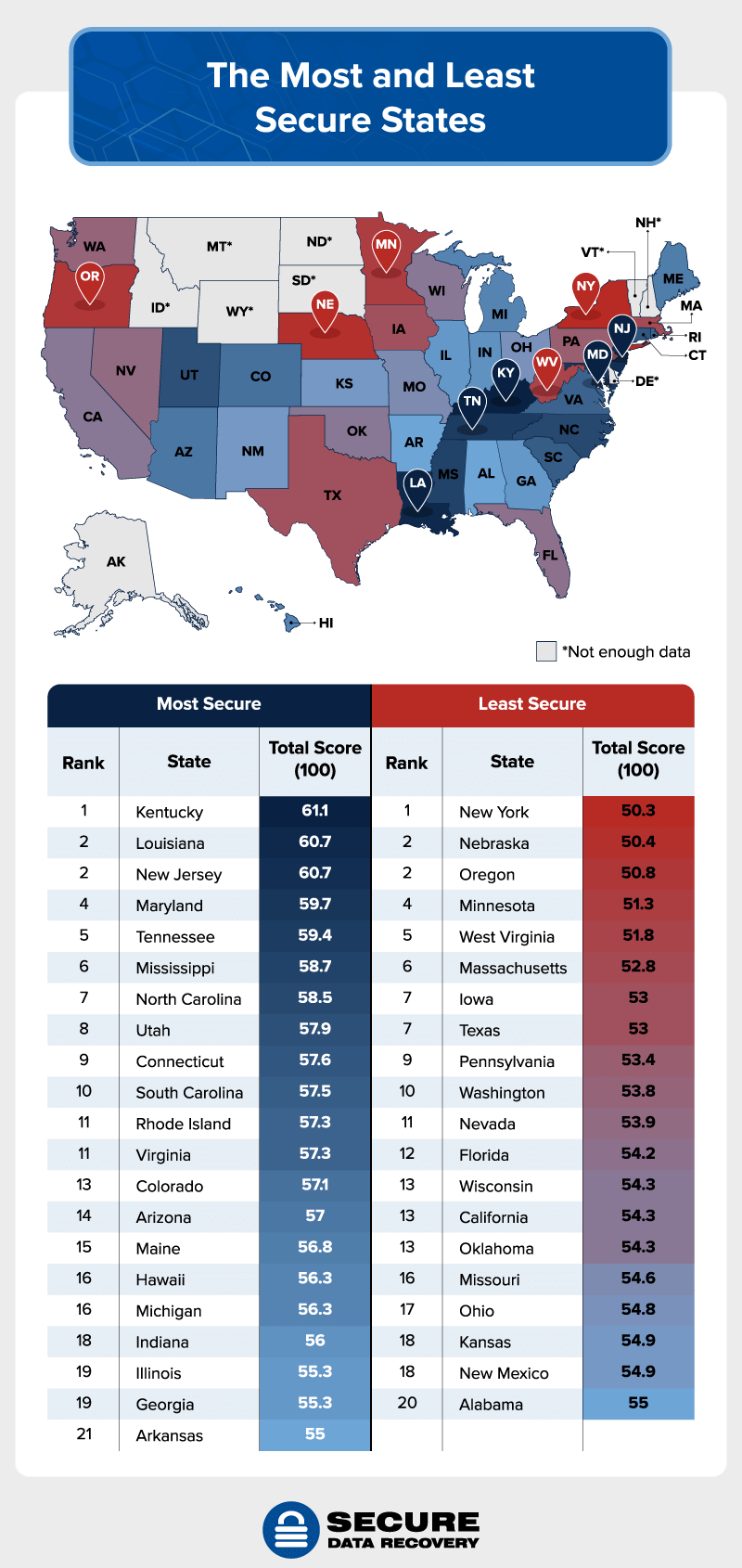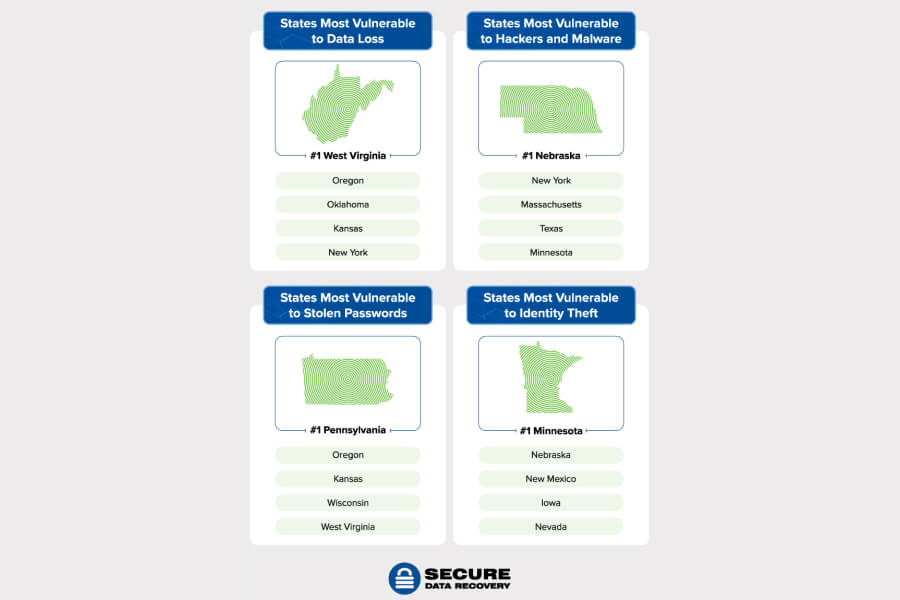In 2021, the FBI’s Internet Crime Complaint Center received over 2.76 million complaints of cyber attacks and malicious cyber activity. Luckily, you can take steps to protect yourself online. When it comes to cyber security and privacy, however, not everyone makes all the right moves. We polled Americans from all 50 states to find out which residents are the most vulnerable to these digital threats, and here’s what we discovered.
Key findings
- Overall, women are more digitally vulnerable than men but women back up their information more frequently.
- 71% stay secure by keeping their phone number, email address, and home address off social media.
- 79% are vulnerable because they don’t use auto-generated passwords
- New York residents are the most digitally vulnerable — 1 in 3 have clicked on suspicious ads, links, or attachments in the past year
- Kentucky is the #1 most digitally secure state with 54% of residents checking every permission related to a new app when they download it and only 26% listing their email, phone number, or address on social media.
The digital privacy habits of Americans
With so much of our busy lives online these days, we don’t always remember to take the necessary precautions to protect our information. Only around half (51%) of people surveyed automatically back up their devices on a regular basis and even less (39%) keep a copy on the cloud.
On the upside, the majority of Americans take some steps to protect their devices from hacking. Over two-thirds of the people surveyed avoid clicking suspicious ads, links, or email attachments (70%) and have antivirus software installed on their device (68%). Less than half, however, automatically download software updates (44%) and stay off free wifi or unsecured networks in public (43%). A paltry 22% use multi-factor authentication whenever available.
Most of us know we should use unique passwords for each account, but only around 57% of us do so. Just over half (54%) of Americans use a password manager to store and manage passwords. Less than a quarter (21%) use the passwords automatically generated by their computers or smartphones.
To protect their personal information, 71% of Americans keep their phone number, email address, and home address off social media, while around 40% check every permission related to a new app when downloaded.
Although women are more responsible with backups than men (56% vs. 53%), women tend to be more vulnerable online. Men generally have stronger passwords than women (41% to 33%), are more cautious with personal information (34% vs. 26%), and are more responsible with hacking prevention (45% to 33%). As a result, 73% of men are digitally vulnerable versus 77% of women.

Ranked: The most and least secure states
We combined various online safety practices to rank the most and least digitally secure states across the country. Kentucky tops our list of secure states with 54% of residents checking every permission when downloading a new app and only 26% listing their email, phone number, or address on social media.
With the lowest total safety score, New York ranks as the most digitally vulnerable state in the U.S. overall. It also has low scores compared to the rest of the nation on vulnerability to hacks (#2), backups (#5), personal information (#10), and passwords (#15). A full third (1 in 3) of state residents have clicked on suspicious ads, links or attachments and over two-thirds (2 in 3) admit to using free wifi or unsecured networks in public, which can put New Yorkers at risk for needing data recovery.

The most vulnerable states by category
In addition to creating overall rankings, we identified the most digitally vulnerable states by category. In terms of performing backups, West Virginia ranks lowest with Oregon, Oklahoma, Kansas, and New York next on the list. Nebraska needs the most help with hacking prevention, followed by New York, Massachusetts, Texas, and Minnesota.
Pennsylvania residents could significantly decrease their digital vulnerability by using better passwords, since they rank as the #1 most vulnerable state for this category. Oregon, Kansas, Wisconsin, and West Virginia round out the top five for password vulnerability. Personal information ranks as most vulnerable in Minnesota, followed by Nebraska, New Mexico, Iowa, and Nevada.

Conclusion
We live in a digital age where our information is just a click away — both to us and to hackers. Due to their residents’ online habits, New York, Nebraska, Oregon may rank as some of the most digitally vulnerable states, but no matter where you live, putting in the right data security measures can protect you, your device, and your data.
Remember to back up your data in multiple places and maintain your external hard drive before it requires data recovery.
Methodology: We surveyed 2,335 people across the United States on the Prolific online research platform, asking about their digital habits. To come up with our rankings, we applied four scoring rules to their responses. Backup habits were given the highest weight followed by hacking prevention habits, password habits, and personal information habits.
Of our respondents, 50% identified as female, 47% as male and 3% non-binary. Respondents' ages ranged from 18 - 77 years old; 21% Gen Z, 49% millennials, 21% Gen X, and 9% Baby Boomers. The average security scores for each generation, out of 100 possible, were: Gen Z (51), millennials (56), Gen X (57) and Baby Boomers (55).







